Implementation of Corporate Social Responsibility
VerifiedAdded on 2020/10/22
|8
|2384
|159
AI Summary
The assignment is a literature review on Corporate Social Responsibility (CSR), which is essential for business success and sustainability. It provides an overview of CSR, its benefits, and the stages of its implementation. The report highlights several UK-based companies that have effectively adopted CSR practices to achieve their business objectives and improve community relationships.
Contribute Materials
Your contribution can guide someone’s learning journey. Share your
documents today.

STUDY SKILLS FOR
HIGHER EDUCATION
1
HIGHER EDUCATION
1
Secure Best Marks with AI Grader
Need help grading? Try our AI Grader for instant feedback on your assignments.
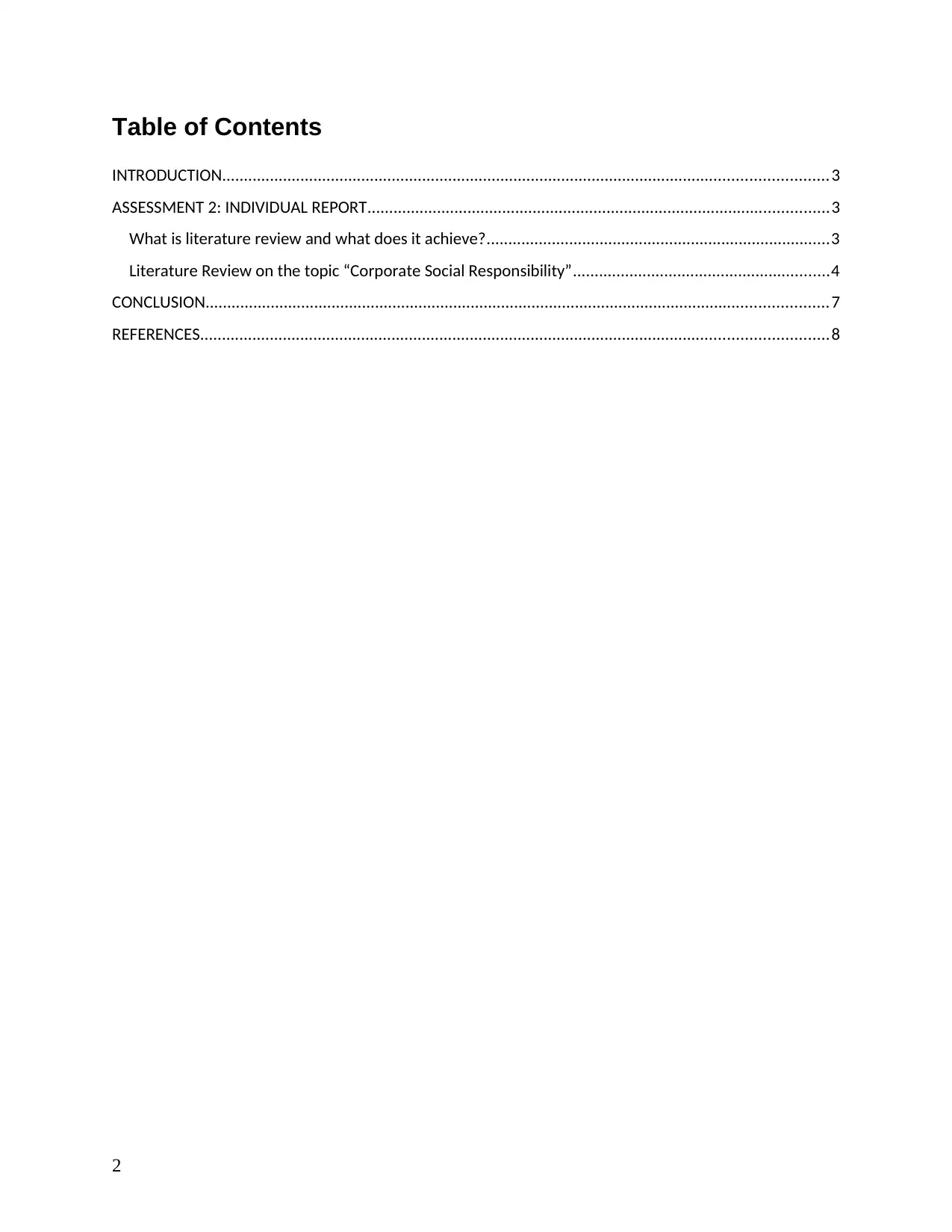
Table of Contents
INTRODUCTION...........................................................................................................................................3
ASSESSMENT 2: INDIVIDUAL REPORT..........................................................................................................3
What is literature review and what does it achieve?...............................................................................3
Literature Review on the topic “Corporate Social Responsibility”...........................................................4
CONCLUSION...............................................................................................................................................7
REFERENCES................................................................................................................................................8
2
INTRODUCTION...........................................................................................................................................3
ASSESSMENT 2: INDIVIDUAL REPORT..........................................................................................................3
What is literature review and what does it achieve?...............................................................................3
Literature Review on the topic “Corporate Social Responsibility”...........................................................4
CONCLUSION...............................................................................................................................................7
REFERENCES................................................................................................................................................8
2
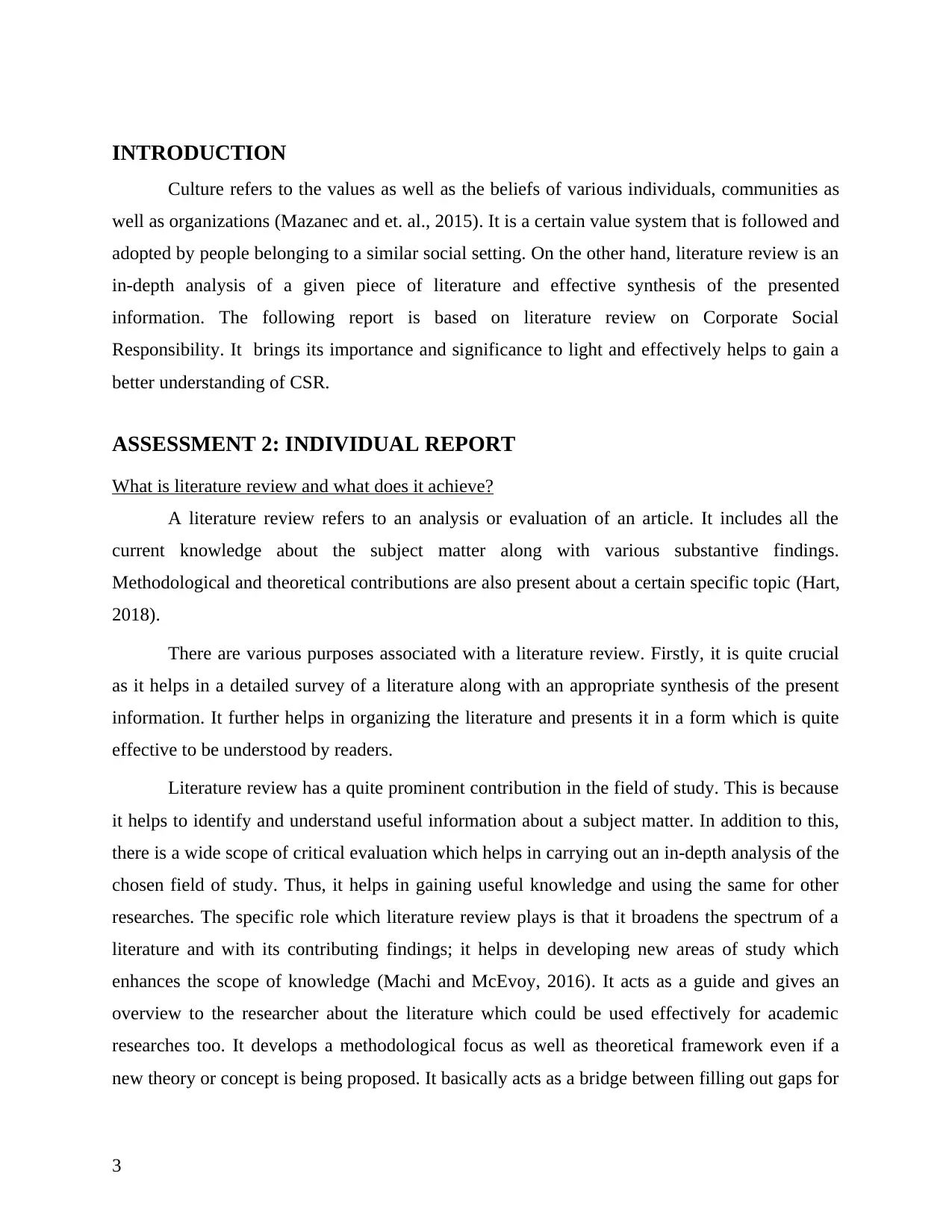
INTRODUCTION
Culture refers to the values as well as the beliefs of various individuals, communities as
well as organizations (Mazanec and et. al., 2015). It is a certain value system that is followed and
adopted by people belonging to a similar social setting. On the other hand, literature review is an
in-depth analysis of a given piece of literature and effective synthesis of the presented
information. The following report is based on literature review on Corporate Social
Responsibility. It brings its importance and significance to light and effectively helps to gain a
better understanding of CSR.
ASSESSMENT 2: INDIVIDUAL REPORT
What is literature review and what does it achieve?
A literature review refers to an analysis or evaluation of an article. It includes all the
current knowledge about the subject matter along with various substantive findings.
Methodological and theoretical contributions are also present about a certain specific topic (Hart,
2018).
There are various purposes associated with a literature review. Firstly, it is quite crucial
as it helps in a detailed survey of a literature along with an appropriate synthesis of the present
information. It further helps in organizing the literature and presents it in a form which is quite
effective to be understood by readers.
Literature review has a quite prominent contribution in the field of study. This is because
it helps to identify and understand useful information about a subject matter. In addition to this,
there is a wide scope of critical evaluation which helps in carrying out an in-depth analysis of the
chosen field of study. Thus, it helps in gaining useful knowledge and using the same for other
researches. The specific role which literature review plays is that it broadens the spectrum of a
literature and with its contributing findings; it helps in developing new areas of study which
enhances the scope of knowledge (Machi and McEvoy, 2016). It acts as a guide and gives an
overview to the researcher about the literature which could be used effectively for academic
researches too. It develops a methodological focus as well as theoretical framework even if a
new theory or concept is being proposed. It basically acts as a bridge between filling out gaps for
3
Culture refers to the values as well as the beliefs of various individuals, communities as
well as organizations (Mazanec and et. al., 2015). It is a certain value system that is followed and
adopted by people belonging to a similar social setting. On the other hand, literature review is an
in-depth analysis of a given piece of literature and effective synthesis of the presented
information. The following report is based on literature review on Corporate Social
Responsibility. It brings its importance and significance to light and effectively helps to gain a
better understanding of CSR.
ASSESSMENT 2: INDIVIDUAL REPORT
What is literature review and what does it achieve?
A literature review refers to an analysis or evaluation of an article. It includes all the
current knowledge about the subject matter along with various substantive findings.
Methodological and theoretical contributions are also present about a certain specific topic (Hart,
2018).
There are various purposes associated with a literature review. Firstly, it is quite crucial
as it helps in a detailed survey of a literature along with an appropriate synthesis of the present
information. It further helps in organizing the literature and presents it in a form which is quite
effective to be understood by readers.
Literature review has a quite prominent contribution in the field of study. This is because
it helps to identify and understand useful information about a subject matter. In addition to this,
there is a wide scope of critical evaluation which helps in carrying out an in-depth analysis of the
chosen field of study. Thus, it helps in gaining useful knowledge and using the same for other
researches. The specific role which literature review plays is that it broadens the spectrum of a
literature and with its contributing findings; it helps in developing new areas of study which
enhances the scope of knowledge (Machi and McEvoy, 2016). It acts as a guide and gives an
overview to the researcher about the literature which could be used effectively for academic
researches too. It develops a methodological focus as well as theoretical framework even if a
new theory or concept is being proposed. It basically acts as a bridge between filling out gaps for
3
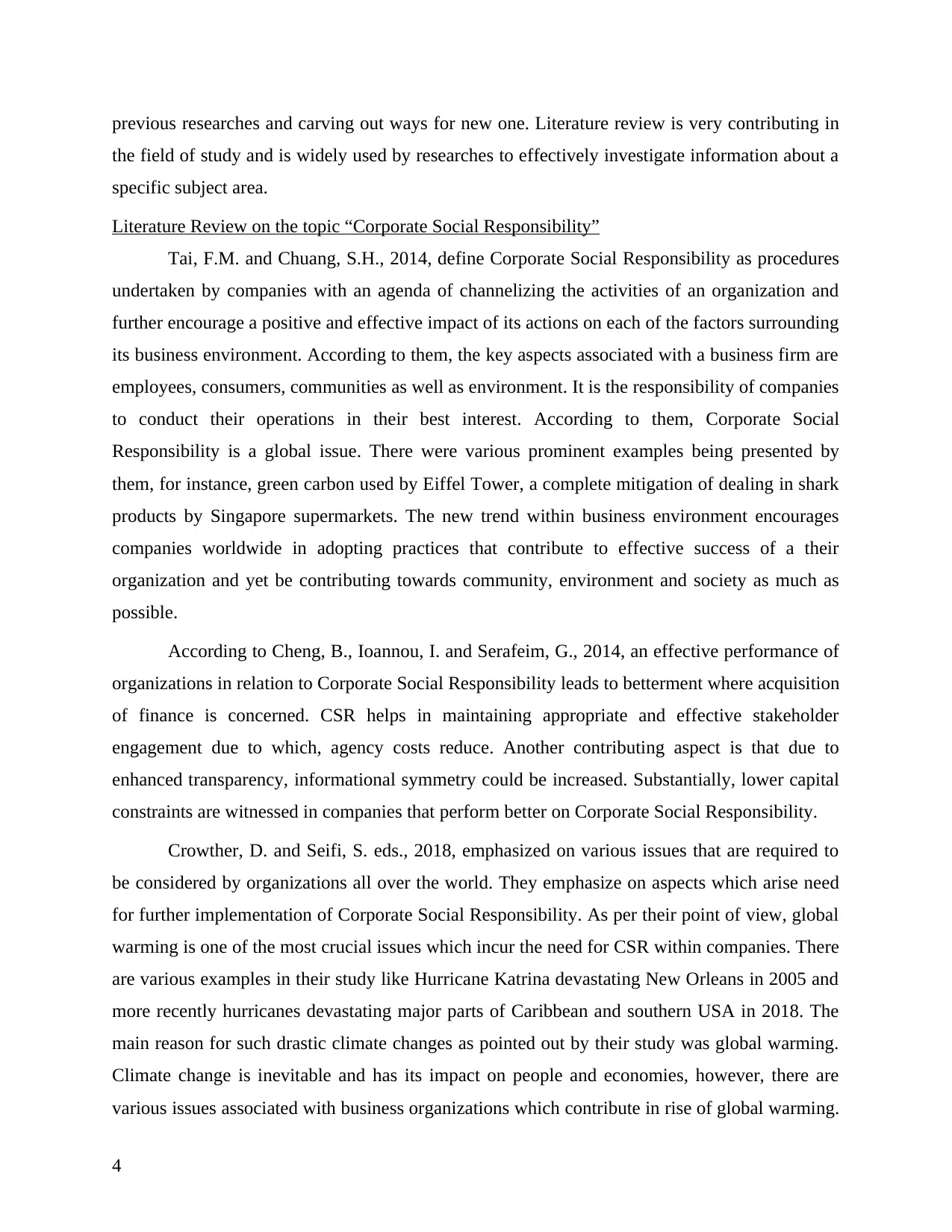
previous researches and carving out ways for new one. Literature review is very contributing in
the field of study and is widely used by researches to effectively investigate information about a
specific subject area.
Literature Review on the topic “Corporate Social Responsibility”
Tai, F.M. and Chuang, S.H., 2014, define Corporate Social Responsibility as procedures
undertaken by companies with an agenda of channelizing the activities of an organization and
further encourage a positive and effective impact of its actions on each of the factors surrounding
its business environment. According to them, the key aspects associated with a business firm are
employees, consumers, communities as well as environment. It is the responsibility of companies
to conduct their operations in their best interest. According to them, Corporate Social
Responsibility is a global issue. There were various prominent examples being presented by
them, for instance, green carbon used by Eiffel Tower, a complete mitigation of dealing in shark
products by Singapore supermarkets. The new trend within business environment encourages
companies worldwide in adopting practices that contribute to effective success of a their
organization and yet be contributing towards community, environment and society as much as
possible.
According to Cheng, B., Ioannou, I. and Serafeim, G., 2014, an effective performance of
organizations in relation to Corporate Social Responsibility leads to betterment where acquisition
of finance is concerned. CSR helps in maintaining appropriate and effective stakeholder
engagement due to which, agency costs reduce. Another contributing aspect is that due to
enhanced transparency, informational symmetry could be increased. Substantially, lower capital
constraints are witnessed in companies that perform better on Corporate Social Responsibility.
Crowther, D. and Seifi, S. eds., 2018, emphasized on various issues that are required to
be considered by organizations all over the world. They emphasize on aspects which arise need
for further implementation of Corporate Social Responsibility. As per their point of view, global
warming is one of the most crucial issues which incur the need for CSR within companies. There
are various examples in their study like Hurricane Katrina devastating New Orleans in 2005 and
more recently hurricanes devastating major parts of Caribbean and southern USA in 2018. The
main reason for such drastic climate changes as pointed out by their study was global warming.
Climate change is inevitable and has its impact on people and economies, however, there are
various issues associated with business organizations which contribute in rise of global warming.
4
the field of study and is widely used by researches to effectively investigate information about a
specific subject area.
Literature Review on the topic “Corporate Social Responsibility”
Tai, F.M. and Chuang, S.H., 2014, define Corporate Social Responsibility as procedures
undertaken by companies with an agenda of channelizing the activities of an organization and
further encourage a positive and effective impact of its actions on each of the factors surrounding
its business environment. According to them, the key aspects associated with a business firm are
employees, consumers, communities as well as environment. It is the responsibility of companies
to conduct their operations in their best interest. According to them, Corporate Social
Responsibility is a global issue. There were various prominent examples being presented by
them, for instance, green carbon used by Eiffel Tower, a complete mitigation of dealing in shark
products by Singapore supermarkets. The new trend within business environment encourages
companies worldwide in adopting practices that contribute to effective success of a their
organization and yet be contributing towards community, environment and society as much as
possible.
According to Cheng, B., Ioannou, I. and Serafeim, G., 2014, an effective performance of
organizations in relation to Corporate Social Responsibility leads to betterment where acquisition
of finance is concerned. CSR helps in maintaining appropriate and effective stakeholder
engagement due to which, agency costs reduce. Another contributing aspect is that due to
enhanced transparency, informational symmetry could be increased. Substantially, lower capital
constraints are witnessed in companies that perform better on Corporate Social Responsibility.
Crowther, D. and Seifi, S. eds., 2018, emphasized on various issues that are required to
be considered by organizations all over the world. They emphasize on aspects which arise need
for further implementation of Corporate Social Responsibility. As per their point of view, global
warming is one of the most crucial issues which incur the need for CSR within companies. There
are various examples in their study like Hurricane Katrina devastating New Orleans in 2005 and
more recently hurricanes devastating major parts of Caribbean and southern USA in 2018. The
main reason for such drastic climate changes as pointed out by their study was global warming.
Climate change is inevitable and has its impact on people and economies, however, there are
various issues associated with business organizations which contribute in rise of global warming.
4
Secure Best Marks with AI Grader
Need help grading? Try our AI Grader for instant feedback on your assignments.
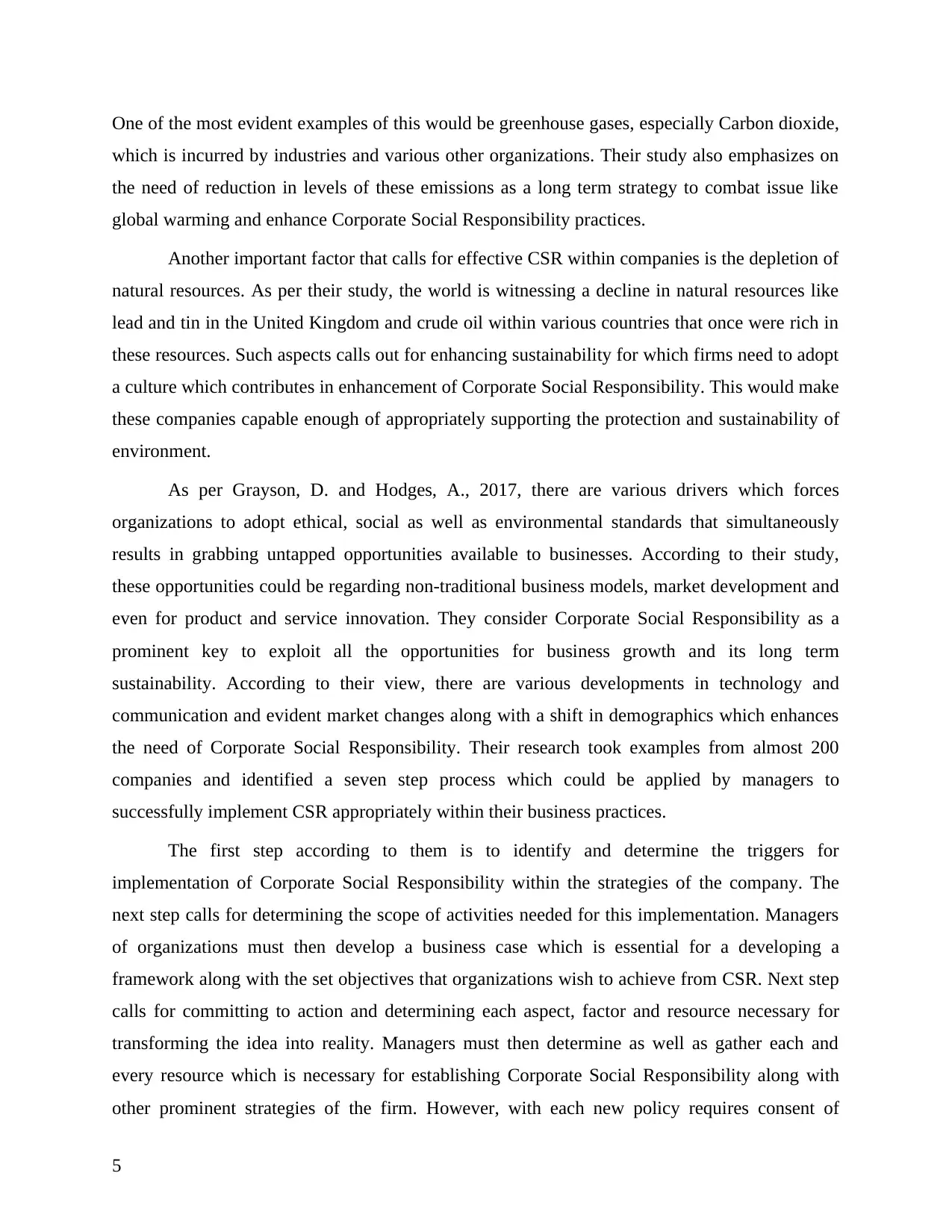
One of the most evident examples of this would be greenhouse gases, especially Carbon dioxide,
which is incurred by industries and various other organizations. Their study also emphasizes on
the need of reduction in levels of these emissions as a long term strategy to combat issue like
global warming and enhance Corporate Social Responsibility practices.
Another important factor that calls for effective CSR within companies is the depletion of
natural resources. As per their study, the world is witnessing a decline in natural resources like
lead and tin in the United Kingdom and crude oil within various countries that once were rich in
these resources. Such aspects calls out for enhancing sustainability for which firms need to adopt
a culture which contributes in enhancement of Corporate Social Responsibility. This would make
these companies capable enough of appropriately supporting the protection and sustainability of
environment.
As per Grayson, D. and Hodges, A., 2017, there are various drivers which forces
organizations to adopt ethical, social as well as environmental standards that simultaneously
results in grabbing untapped opportunities available to businesses. According to their study,
these opportunities could be regarding non-traditional business models, market development and
even for product and service innovation. They consider Corporate Social Responsibility as a
prominent key to exploit all the opportunities for business growth and its long term
sustainability. According to their view, there are various developments in technology and
communication and evident market changes along with a shift in demographics which enhances
the need of Corporate Social Responsibility. Their research took examples from almost 200
companies and identified a seven step process which could be applied by managers to
successfully implement CSR appropriately within their business practices.
The first step according to them is to identify and determine the triggers for
implementation of Corporate Social Responsibility within the strategies of the company. The
next step calls for determining the scope of activities needed for this implementation. Managers
of organizations must then develop a business case which is essential for a developing a
framework along with the set objectives that organizations wish to achieve from CSR. Next step
calls for committing to action and determining each aspect, factor and resource necessary for
transforming the idea into reality. Managers must then determine as well as gather each and
every resource which is necessary for establishing Corporate Social Responsibility along with
other prominent strategies of the firm. However, with each new policy requires consent of
5
which is incurred by industries and various other organizations. Their study also emphasizes on
the need of reduction in levels of these emissions as a long term strategy to combat issue like
global warming and enhance Corporate Social Responsibility practices.
Another important factor that calls for effective CSR within companies is the depletion of
natural resources. As per their study, the world is witnessing a decline in natural resources like
lead and tin in the United Kingdom and crude oil within various countries that once were rich in
these resources. Such aspects calls out for enhancing sustainability for which firms need to adopt
a culture which contributes in enhancement of Corporate Social Responsibility. This would make
these companies capable enough of appropriately supporting the protection and sustainability of
environment.
As per Grayson, D. and Hodges, A., 2017, there are various drivers which forces
organizations to adopt ethical, social as well as environmental standards that simultaneously
results in grabbing untapped opportunities available to businesses. According to their study,
these opportunities could be regarding non-traditional business models, market development and
even for product and service innovation. They consider Corporate Social Responsibility as a
prominent key to exploit all the opportunities for business growth and its long term
sustainability. According to their view, there are various developments in technology and
communication and evident market changes along with a shift in demographics which enhances
the need of Corporate Social Responsibility. Their research took examples from almost 200
companies and identified a seven step process which could be applied by managers to
successfully implement CSR appropriately within their business practices.
The first step according to them is to identify and determine the triggers for
implementation of Corporate Social Responsibility within the strategies of the company. The
next step calls for determining the scope of activities needed for this implementation. Managers
of organizations must then develop a business case which is essential for a developing a
framework along with the set objectives that organizations wish to achieve from CSR. Next step
calls for committing to action and determining each aspect, factor and resource necessary for
transforming the idea into reality. Managers must then determine as well as gather each and
every resource which is necessary for establishing Corporate Social Responsibility along with
other prominent strategies of the firm. However, with each new policy requires consent of
5
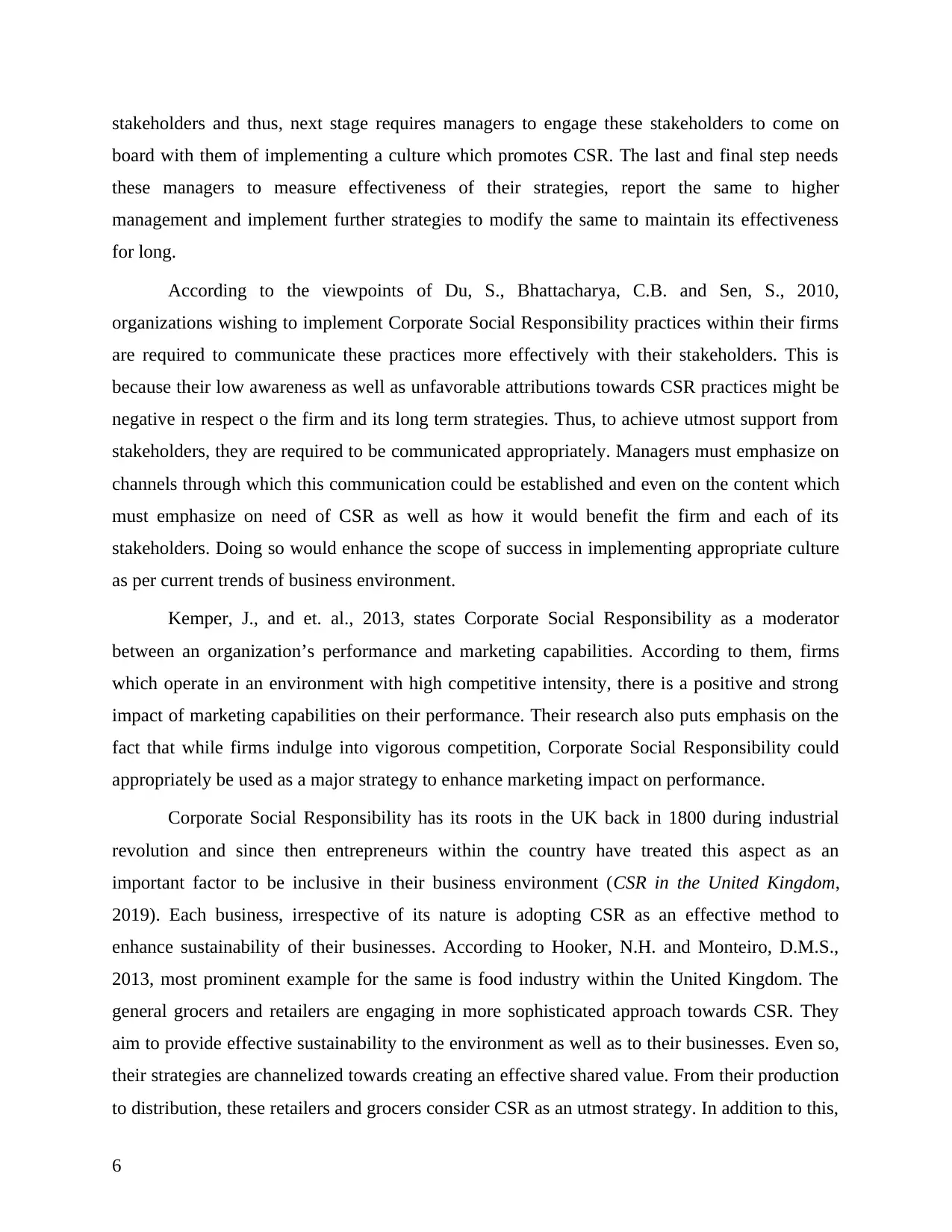
stakeholders and thus, next stage requires managers to engage these stakeholders to come on
board with them of implementing a culture which promotes CSR. The last and final step needs
these managers to measure effectiveness of their strategies, report the same to higher
management and implement further strategies to modify the same to maintain its effectiveness
for long.
According to the viewpoints of Du, S., Bhattacharya, C.B. and Sen, S., 2010,
organizations wishing to implement Corporate Social Responsibility practices within their firms
are required to communicate these practices more effectively with their stakeholders. This is
because their low awareness as well as unfavorable attributions towards CSR practices might be
negative in respect o the firm and its long term strategies. Thus, to achieve utmost support from
stakeholders, they are required to be communicated appropriately. Managers must emphasize on
channels through which this communication could be established and even on the content which
must emphasize on need of CSR as well as how it would benefit the firm and each of its
stakeholders. Doing so would enhance the scope of success in implementing appropriate culture
as per current trends of business environment.
Kemper, J., and et. al., 2013, states Corporate Social Responsibility as a moderator
between an organization’s performance and marketing capabilities. According to them, firms
which operate in an environment with high competitive intensity, there is a positive and strong
impact of marketing capabilities on their performance. Their research also puts emphasis on the
fact that while firms indulge into vigorous competition, Corporate Social Responsibility could
appropriately be used as a major strategy to enhance marketing impact on performance.
Corporate Social Responsibility has its roots in the UK back in 1800 during industrial
revolution and since then entrepreneurs within the country have treated this aspect as an
important factor to be inclusive in their business environment (CSR in the United Kingdom,
2019). Each business, irrespective of its nature is adopting CSR as an effective method to
enhance sustainability of their businesses. According to Hooker, N.H. and Monteiro, D.M.S.,
2013, most prominent example for the same is food industry within the United Kingdom. The
general grocers and retailers are engaging in more sophisticated approach towards CSR. They
aim to provide effective sustainability to the environment as well as to their businesses. Even so,
their strategies are channelized towards creating an effective shared value. From their production
to distribution, these retailers and grocers consider CSR as an utmost strategy. In addition to this,
6
board with them of implementing a culture which promotes CSR. The last and final step needs
these managers to measure effectiveness of their strategies, report the same to higher
management and implement further strategies to modify the same to maintain its effectiveness
for long.
According to the viewpoints of Du, S., Bhattacharya, C.B. and Sen, S., 2010,
organizations wishing to implement Corporate Social Responsibility practices within their firms
are required to communicate these practices more effectively with their stakeholders. This is
because their low awareness as well as unfavorable attributions towards CSR practices might be
negative in respect o the firm and its long term strategies. Thus, to achieve utmost support from
stakeholders, they are required to be communicated appropriately. Managers must emphasize on
channels through which this communication could be established and even on the content which
must emphasize on need of CSR as well as how it would benefit the firm and each of its
stakeholders. Doing so would enhance the scope of success in implementing appropriate culture
as per current trends of business environment.
Kemper, J., and et. al., 2013, states Corporate Social Responsibility as a moderator
between an organization’s performance and marketing capabilities. According to them, firms
which operate in an environment with high competitive intensity, there is a positive and strong
impact of marketing capabilities on their performance. Their research also puts emphasis on the
fact that while firms indulge into vigorous competition, Corporate Social Responsibility could
appropriately be used as a major strategy to enhance marketing impact on performance.
Corporate Social Responsibility has its roots in the UK back in 1800 during industrial
revolution and since then entrepreneurs within the country have treated this aspect as an
important factor to be inclusive in their business environment (CSR in the United Kingdom,
2019). Each business, irrespective of its nature is adopting CSR as an effective method to
enhance sustainability of their businesses. According to Hooker, N.H. and Monteiro, D.M.S.,
2013, most prominent example for the same is food industry within the United Kingdom. The
general grocers and retailers are engaging in more sophisticated approach towards CSR. They
aim to provide effective sustainability to the environment as well as to their businesses. Even so,
their strategies are channelized towards creating an effective shared value. From their production
to distribution, these retailers and grocers consider CSR as an utmost strategy. In addition to this,
6
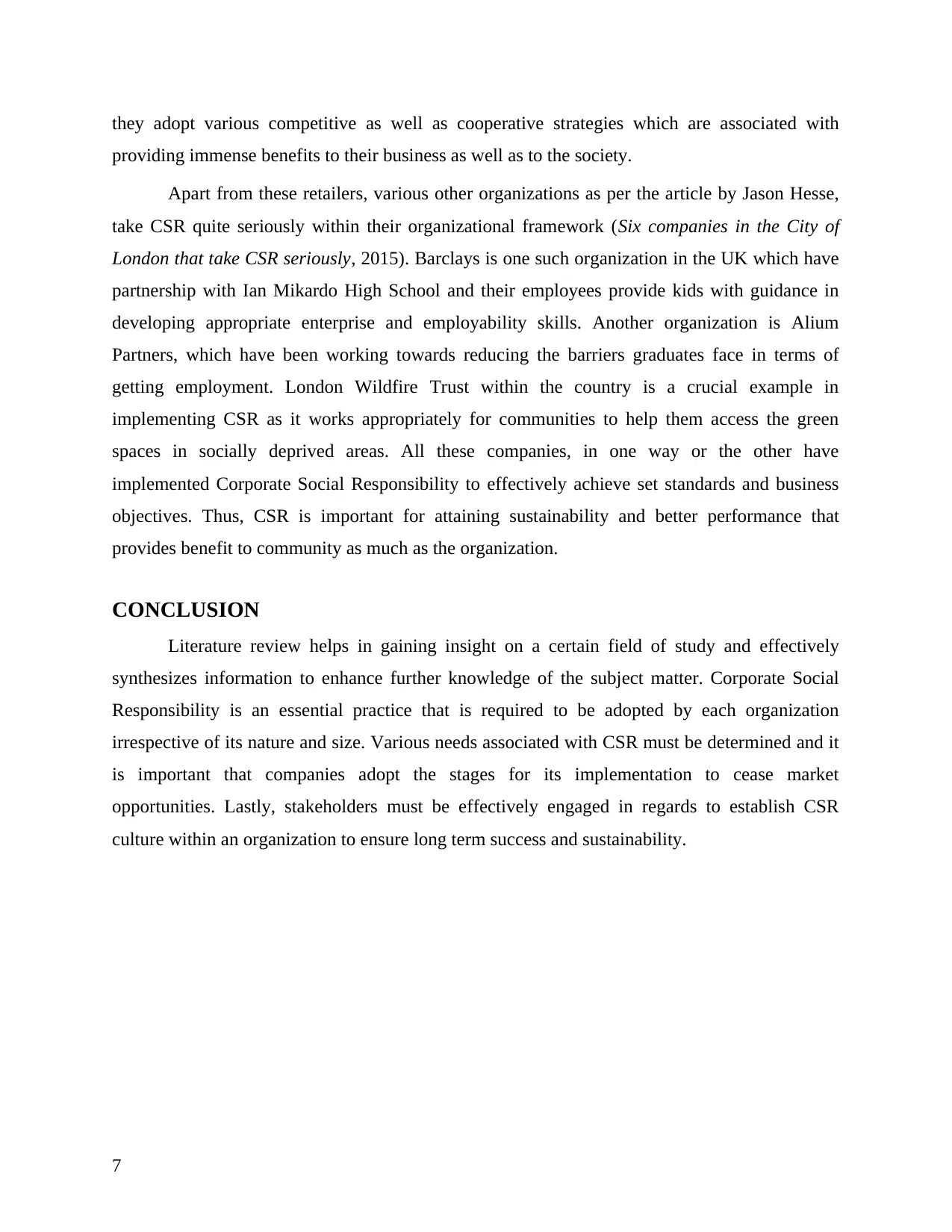
they adopt various competitive as well as cooperative strategies which are associated with
providing immense benefits to their business as well as to the society.
Apart from these retailers, various other organizations as per the article by Jason Hesse,
take CSR quite seriously within their organizational framework (Six companies in the City of
London that take CSR seriously, 2015). Barclays is one such organization in the UK which have
partnership with Ian Mikardo High School and their employees provide kids with guidance in
developing appropriate enterprise and employability skills. Another organization is Alium
Partners, which have been working towards reducing the barriers graduates face in terms of
getting employment. London Wildfire Trust within the country is a crucial example in
implementing CSR as it works appropriately for communities to help them access the green
spaces in socially deprived areas. All these companies, in one way or the other have
implemented Corporate Social Responsibility to effectively achieve set standards and business
objectives. Thus, CSR is important for attaining sustainability and better performance that
provides benefit to community as much as the organization.
CONCLUSION
Literature review helps in gaining insight on a certain field of study and effectively
synthesizes information to enhance further knowledge of the subject matter. Corporate Social
Responsibility is an essential practice that is required to be adopted by each organization
irrespective of its nature and size. Various needs associated with CSR must be determined and it
is important that companies adopt the stages for its implementation to cease market
opportunities. Lastly, stakeholders must be effectively engaged in regards to establish CSR
culture within an organization to ensure long term success and sustainability.
7
providing immense benefits to their business as well as to the society.
Apart from these retailers, various other organizations as per the article by Jason Hesse,
take CSR quite seriously within their organizational framework (Six companies in the City of
London that take CSR seriously, 2015). Barclays is one such organization in the UK which have
partnership with Ian Mikardo High School and their employees provide kids with guidance in
developing appropriate enterprise and employability skills. Another organization is Alium
Partners, which have been working towards reducing the barriers graduates face in terms of
getting employment. London Wildfire Trust within the country is a crucial example in
implementing CSR as it works appropriately for communities to help them access the green
spaces in socially deprived areas. All these companies, in one way or the other have
implemented Corporate Social Responsibility to effectively achieve set standards and business
objectives. Thus, CSR is important for attaining sustainability and better performance that
provides benefit to community as much as the organization.
CONCLUSION
Literature review helps in gaining insight on a certain field of study and effectively
synthesizes information to enhance further knowledge of the subject matter. Corporate Social
Responsibility is an essential practice that is required to be adopted by each organization
irrespective of its nature and size. Various needs associated with CSR must be determined and it
is important that companies adopt the stages for its implementation to cease market
opportunities. Lastly, stakeholders must be effectively engaged in regards to establish CSR
culture within an organization to ensure long term success and sustainability.
7
Paraphrase This Document
Need a fresh take? Get an instant paraphrase of this document with our AI Paraphraser
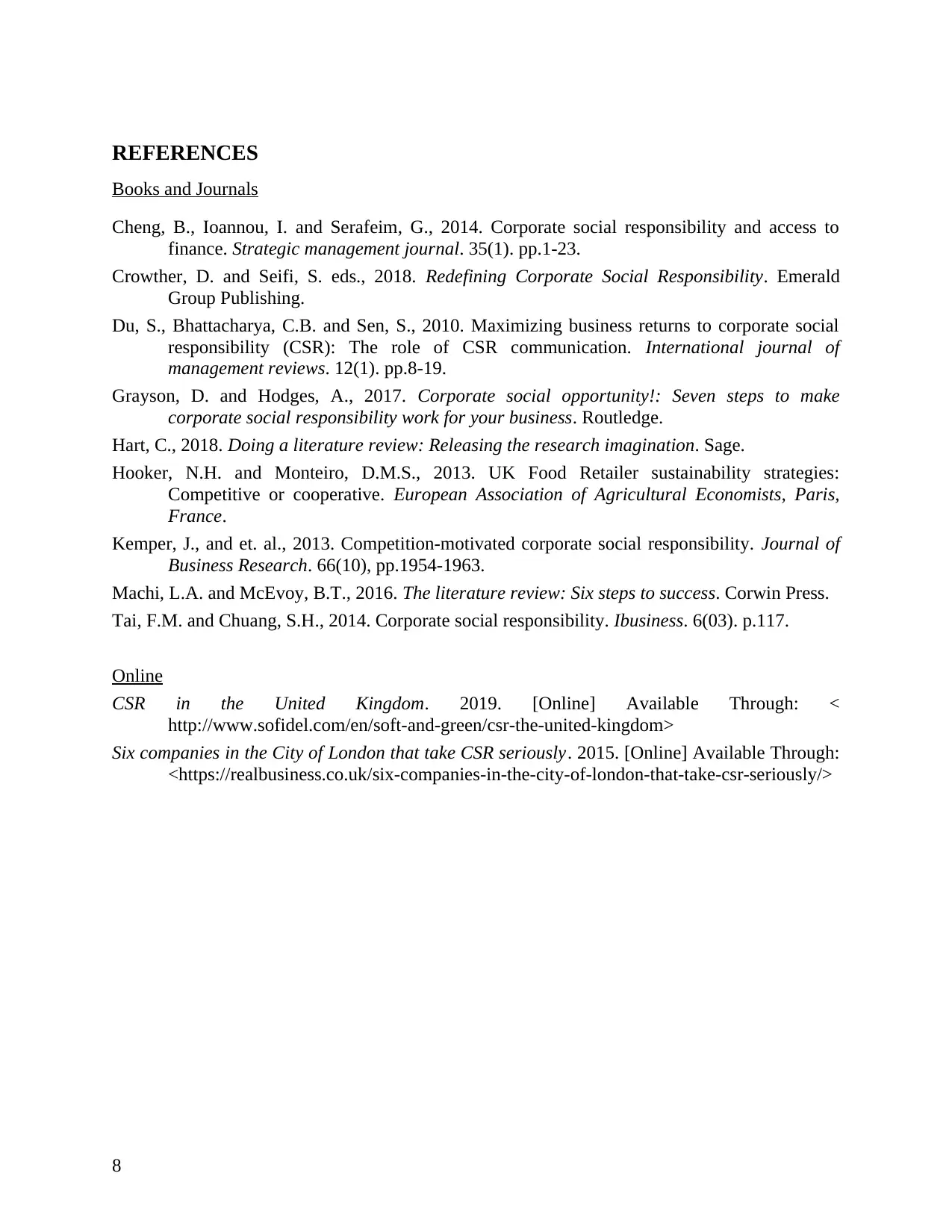
REFERENCES
Books and Journals
Cheng, B., Ioannou, I. and Serafeim, G., 2014. Corporate social responsibility and access to
finance. Strategic management journal. 35(1). pp.1-23.
Crowther, D. and Seifi, S. eds., 2018. Redefining Corporate Social Responsibility. Emerald
Group Publishing.
Du, S., Bhattacharya, C.B. and Sen, S., 2010. Maximizing business returns to corporate social
responsibility (CSR): The role of CSR communication. International journal of
management reviews. 12(1). pp.8-19.
Grayson, D. and Hodges, A., 2017. Corporate social opportunity!: Seven steps to make
corporate social responsibility work for your business. Routledge.
Hart, C., 2018. Doing a literature review: Releasing the research imagination. Sage.
Hooker, N.H. and Monteiro, D.M.S., 2013. UK Food Retailer sustainability strategies:
Competitive or cooperative. European Association of Agricultural Economists, Paris,
France.
Kemper, J., and et. al., 2013. Competition-motivated corporate social responsibility. Journal of
Business Research. 66(10), pp.1954-1963.
Machi, L.A. and McEvoy, B.T., 2016. The literature review: Six steps to success. Corwin Press.
Tai, F.M. and Chuang, S.H., 2014. Corporate social responsibility. Ibusiness. 6(03). p.117.
Online
CSR in the United Kingdom. 2019. [Online] Available Through: <
http://www.sofidel.com/en/soft-and-green/csr-the-united-kingdom>
Six companies in the City of London that take CSR seriously. 2015. [Online] Available Through:
<https://realbusiness.co.uk/six-companies-in-the-city-of-london-that-take-csr-seriously/>
8
Books and Journals
Cheng, B., Ioannou, I. and Serafeim, G., 2014. Corporate social responsibility and access to
finance. Strategic management journal. 35(1). pp.1-23.
Crowther, D. and Seifi, S. eds., 2018. Redefining Corporate Social Responsibility. Emerald
Group Publishing.
Du, S., Bhattacharya, C.B. and Sen, S., 2010. Maximizing business returns to corporate social
responsibility (CSR): The role of CSR communication. International journal of
management reviews. 12(1). pp.8-19.
Grayson, D. and Hodges, A., 2017. Corporate social opportunity!: Seven steps to make
corporate social responsibility work for your business. Routledge.
Hart, C., 2018. Doing a literature review: Releasing the research imagination. Sage.
Hooker, N.H. and Monteiro, D.M.S., 2013. UK Food Retailer sustainability strategies:
Competitive or cooperative. European Association of Agricultural Economists, Paris,
France.
Kemper, J., and et. al., 2013. Competition-motivated corporate social responsibility. Journal of
Business Research. 66(10), pp.1954-1963.
Machi, L.A. and McEvoy, B.T., 2016. The literature review: Six steps to success. Corwin Press.
Tai, F.M. and Chuang, S.H., 2014. Corporate social responsibility. Ibusiness. 6(03). p.117.
Online
CSR in the United Kingdom. 2019. [Online] Available Through: <
http://www.sofidel.com/en/soft-and-green/csr-the-united-kingdom>
Six companies in the City of London that take CSR seriously. 2015. [Online] Available Through:
<https://realbusiness.co.uk/six-companies-in-the-city-of-london-that-take-csr-seriously/>
8
1 out of 8
Related Documents
Your All-in-One AI-Powered Toolkit for Academic Success.
+13062052269
info@desklib.com
Available 24*7 on WhatsApp / Email
![[object Object]](/_next/static/media/star-bottom.7253800d.svg)
Unlock your academic potential
© 2024 | Zucol Services PVT LTD | All rights reserved.





